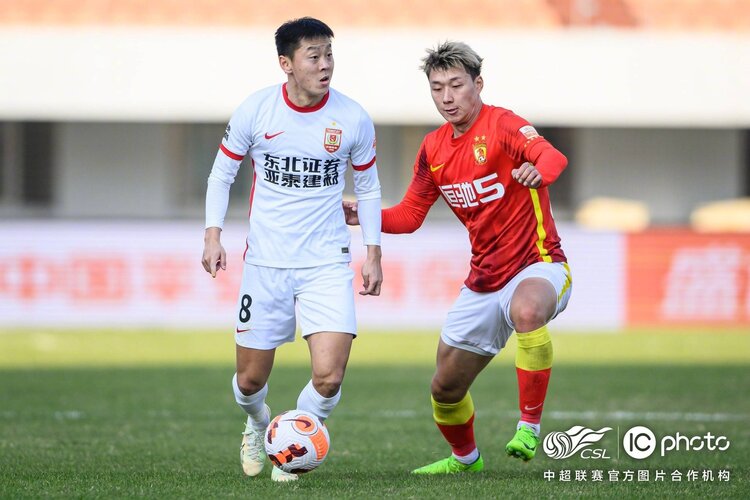It’s official. Guangzhou FC, the most dominant team in Chinese football over the past decade, have had their relegation from the Chinese Super League confirmed today.
The 2022 Chinese Super League season was always going to be difficult for Guangzhou FC, who have played the majority of the season with primarily youth team players and just a handful of legitimately recognised first-teamers. Now, they have been officially consigned to relegation down to China League One courtesy of a 4-1 defeat to mid-table side Changchun Yatai.
Zheng Zhi’s side, who only had Wei Shihao, Yan Dinghao and Yang Liyu as genuine first-team players in the starting line-up, conceded in the opening 10 minutes through a Wang Jinxian strike, but pulled things back through Yan Dinghao just over 15 minutes later. The equaliser gave them hope, but Cheng Changcheng scored in the 56th minute, Li Jiaheng conceded an own goal five minutes later and Chinese international Tan Long netted in the 78th to seal Guangzhou’s fate.
The result, and its subsequent consequence, will be a shock to many inside and outside of China, and it is a far cry from what the club had been known for throughout the 2010s.
Decade of Dominance
The 2010s will forever be known for the utter dominance Guangzhou FC, then-named Guangzhou Evergrande, had on Chinese football. Their dominance began exactly one season following their 2010 China League One title, which saw them secure promotion back into the Chinese Super League after spending one year in the second tier following their forced relegation for match-fixing in 2009.
Guangzhou claimed their first-ever Chinese Super League title in 2011, guided by Brazilian striker Muriqui’s 16 goals, fellow countryman Cléo’s 10 and the highly-paid and then-record signing Darío Conca’s nine. They raced to the championship and finished 15 points ahead of second-placed Bejing Guoan and 18 ahead of third-placed Liaoning Hongyun.
The 2011 season was the first domino to fall that would see the club become the golden jewel of Chinese football, and home to a number of high-profile foreign managers such as Marcello Lippi, Fabio Cannavaro and Luis Felipe Scolari. From 2011 to 2019, Guangzhou claimed a joint-record eight Chinese Super League titles, only missing out in 2018, two Chinese FA Cups (2012, 2016), four Chinese FA Super Cups (2012, 2016, 2017, 2018) and of course two AFC Champions Leagues in 2013 and 2015.
The continental success saw them become only the second Chinese side to win the competition, after Liaoning’s victory in the 1989-90 season before football turned professional in China, making them the only club from the Middle Kingdom with two continental titles. The 2010s truly were the golden era for the club, who had a number of memorable import and domestic players among their ranks, including Elkeson, Paulinho, Gao Lin, Zeng Cheng, Jackson Martinez, Zheng Zhi, and Huang Bowen.
They were also the pioneers and largest users of the China naturalisation programme that saw a number of import players accept Chinese nationality and become members of the China National Team. Elkeson (Ai Kesen), Tyias Browning (Jiang Guangtai), Alan (A Lan) and Ricardo Goulart (Gao Late) were all players who accepted Chinese nationality, though Goulart never featured for the national side and has begun the process of regaining his Brazilian nationality.
They were big spenders throughout the decade, leading the wave of money that made many fans around the world nervous with so many big-name players opting to head to China instead of making moves around Europe or elsewhere. But, as has been the case over the past few seasons, the money could only last for so long.
Fate Destined
While the casual observer of Chinese football would find the news of Guangzhou’s relegation to be astonishing, those that keep a close eye on things will have expected this outcome since before the first ball was kicked for the 2022 season. Prior to the season, it was revealed that Evergrande Group, the majority owner of the team, were suffering severe financial difficulties due to the ongoing Coronavirus pandemic, and had decided to effectively pull most of their funding from the team.
Players out of contract were released after the 2021 season, including all import/naturalised players as well as most of the team’s best domestic players. This left Guangzhou effectively fielding their reserve/youth team along with a handful of remaining first-teamers who were determined to help the club through this difficult time.
Hao Junmin unretired and signed with the club to help out, Zheng Zhi took the managerial role on a full-time basis, and the club did what it could to survive. But to everyone watching the saga unfold, it was clear that relegation would be the most likely outcome for the team when all was said and done.
There are plenty of promising young players in the team, and there’s a possibility the club will perform well in the second tier and help to develop the young players into solid professionals, but with the financial dark cloud still hanging over the team, the future does not look overly optimistic for Guangzhou.
Assuming their Chinese Super League future is officially over, with the potential to return dependent on the state of other teams in the league, including those that have also been relegated, it may be a long time before Guangzhou resembles anything close to what they were throughout their dominant decade. As of now, the rebuilding begins and a chance to regrow through the second tier is presented that could help the team secure a longer-term future, with costs likely to remain low due to the youth team setup they are now operating and the likelihood that remaining first-team players will leave.
